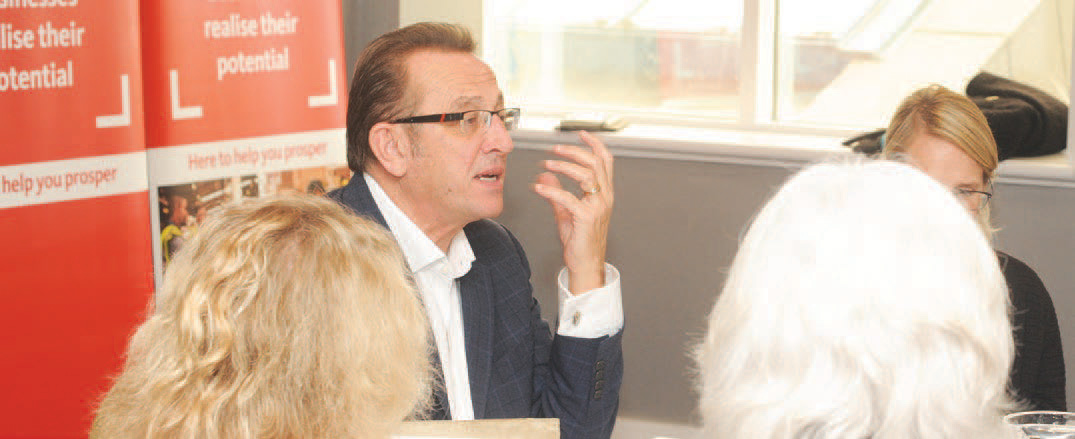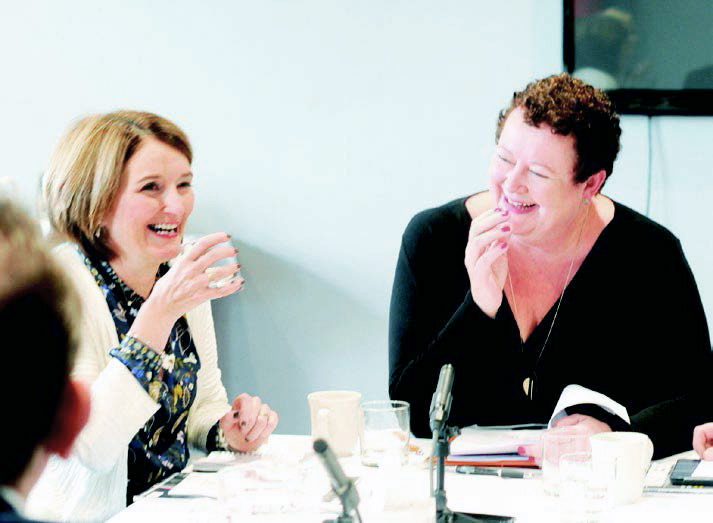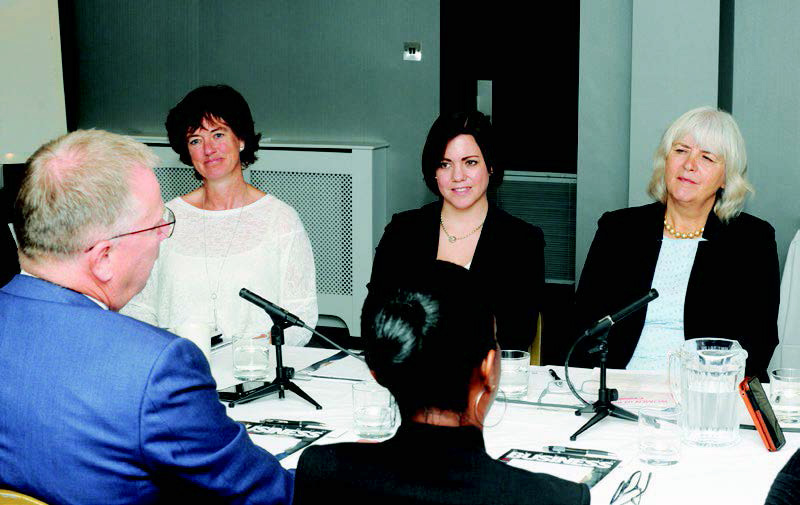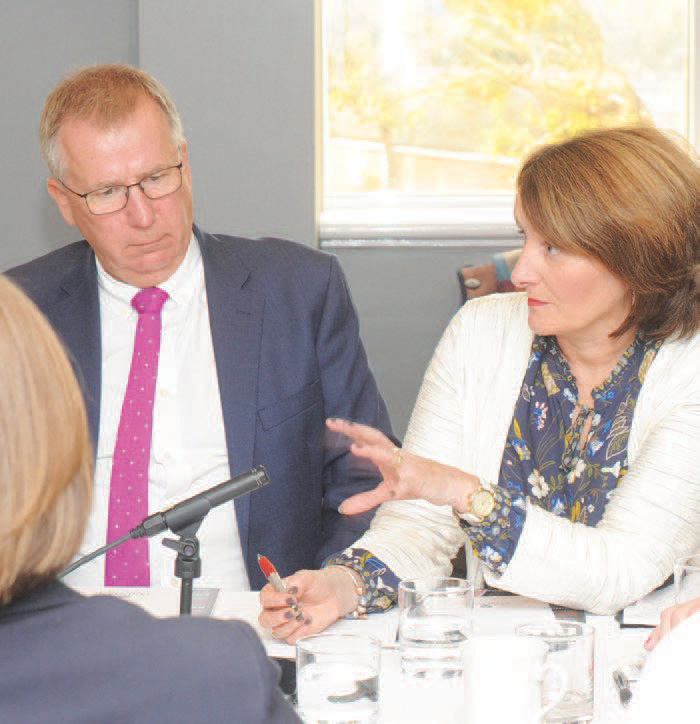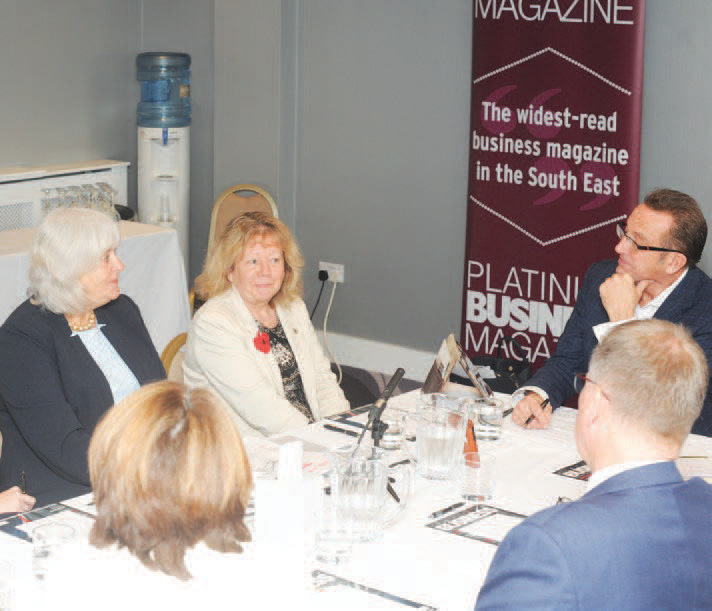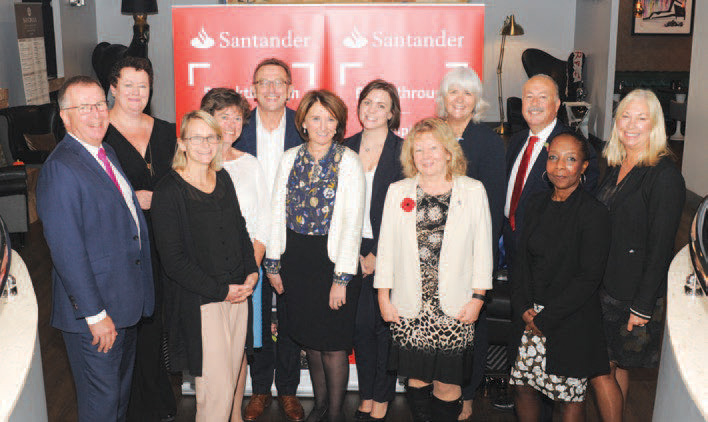
In the first of a series of in-depth debates, we gathered together eight successful businesswomen (and one businessman) to discuss whether gender inequality in business has been eliminated. The debate was hosted by the Sandman Signature Gatwick Hotel and chaired by Maarten Hoffmann.
In 2018, we will be celebrating the 100th anniversary of women having the right to vote. The UK of 1918 was a place where women were effectively second-class citizens. How far have we come in the last 100 years? Is there equality of opportunity? Why are there so few female business leaders? Do women face sexism in the workplace?
We started by asking our panel to rate out of ten how far we have come.
A mark of zero out of ten would indicate nothing has changed. Ten out of ten would represent that we have achieved complete gender equality

Rosemary French OBE
Executive Director, Gatwick Diamond Initiative
Equality Rating: 2/10
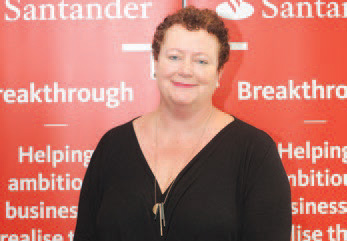
Fiona Schaffer
CEO, MD HUB
Equality Rating: 7/10
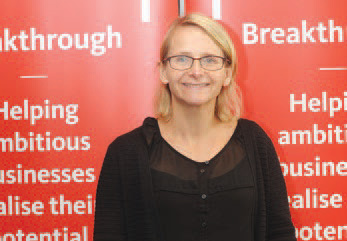
Tamara Roberts
CEO, Ridgeview Wine Estate
Equality Rating: 5/10
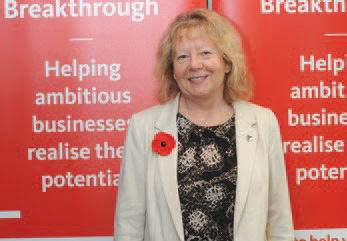
Louise Punter
CEO, Surrey Chambers of Commerce
Equality Rating: 7/10
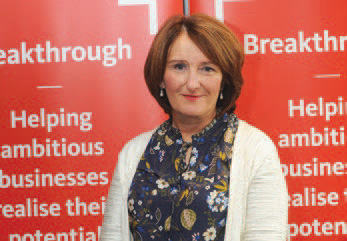
Louise Robinson
Head of Breakthrough, Santander
Equality Rating: 6/10

Katie Hughes
Deputy Regional Director for Santander Business
Equality Rating: 5/10
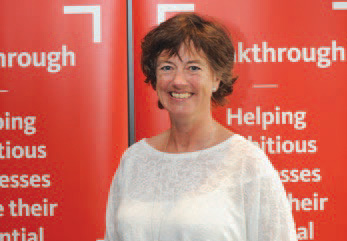
Selina Russell
CEO, Cheeky Rascals
Equality Rating: 7/10
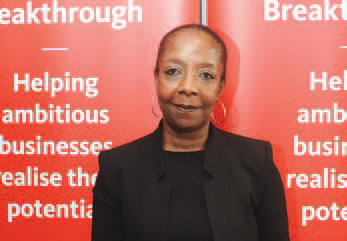
Barbara Quartey
CEO, Insights School & Skills Academy
Equality Rating: 5/10

Jeremy Burbidge
CEO, TicketMedia
Equality Rating: 4/10
Experiences of sexism in the workplace
Maarten Hoffmann (MH): Has anyone directly suffered discrimination at work?
Selina Russell (SR): When I was at ICI, my boss wrote me a letter asking me to go and live with him and be the mother of his children because his wife had just left him. That put me in a very awkward position. I said no, but I never said anything about the incident. I was working in a very male dominated environment and was one of only few women working at ICI. By speaking out I felt like I might have jeopardised my career.
Rosemary French (RF): When I was 23, I was at John Menzies and doing really well. When I went in for my appraisal with the HR and Finance Director, he told me how well I was doing, so I asked for the same salary as my colleague Mike who was at exactly the same stage as me.
He said, “Oh, you don’t need that, Rosemary. You’re going to have children and you’re going to be at home, so you don’t need the same salary. Mike is going to have to bring up his family.” I walked out a bit shocked and I got another job. All that training had been wasted.
I didn’t dream of reporting the matter. I joined Boots where there was a much better culture of working.
Louise Robinson (LR): When I left university, I applied for their graduate programme at a large high street fashion chain. I fought my way to the third and final interview. At the very end they said, “You need to go into this room now” and they wanted to weigh and measure me because they wanted to have people who worked in their stores who could wear their clothes. At that point I walked out.
My dad asked how it went and I told him what happened. He just patted me on the back and said “Good girl.” That was in 1985.
I just didn’t want to be a clothes horse. I felt I’d worked hard for my degree and I wanted to get a job that reflected the way that I worked.
Louise Punter (LP): Back in 1980 I was the first female executive at a factory in Wrexham, North Wales, and they had this very old-fashioned policy where they’d stop for coffee every morning at 11am. For the first half a dozen meetings the conversation was more about what colour my tights were than what was happening in the commercial business.
SR: At ICI the assumption at meetings was that I would make the tea and coffee, but I never made it once. There was just the assumption: You’re the only female in the room, you will get the coffee.
They just didn’t know how to cope because 1) they’d never had a woman around the table as an equal before, and 2) she said no!
Tamara Roberts (TR): When I was working for Price Waterhouse Coopers in banking insurance, there was a very bright girl working in another banking team. I heard that all of the guys she’d been working with had been given an extra bonus and pay rise but she hadn’t. I booked an appointment with the partner in charge and said “Why has she not got that when everyone else in the group has?” It didn’t make me particularly popular.
In the end she did get the bonus because I had ruffled a few feathers. But this was in the late 1990s, and it shouldn’t have happened. I was outraged that something like that could be happening and openly spoken about in front of other people. And what annoyed me even more was that the guys who were working with her said nothing.
MH: In 2009 the Bank of England held a seminar for its female employees called Dress for Success where they were informed, amongst other things, to always wear make-up and high shoes. There was no such equivalent for men. Is this the ultimate in sexism?
RF: There’s nothing you can say to that except that no woman should work for that company. End of story.
Why has sexist behaviour been seen as acceptable?
Jeremy Burbidge (JB): It’s down to education. The people that I find are sexist have usually been in a male-dominated society and that’s where they’ve always been. It’s the Rugby club type of environment where it becomes acceptable, or rather it’s not acceptable, not to be part of the group.
RF: Education, certainly at school level, has improved tremendously and boys and girls are coming out much more equal and ambitious. But what happens is, once they get into the work place the barriers appear. I think it’s an ingrained culture. As long as I’m still expected to cook the meals, do the hoovering and the ironing, wash the dishes or at least load the dishwasher it’s not going to change.
TR: If you’re a child living in a household with very gender specific roles that’s where it starts. I’m very lucky because my household was never like that growing up, and it isn’t like that now.
I go into schools and say: “Try and guess what I do for a living?” I’m still really concerned that when I walk into a secondary schools, they assume that I’m going to be in fashion, design or marketing. Or caring roles. Do I work with children, in a hospital, am I a nurse? I’m immediately pigeon-holed into something because of my gender. I couldn’t possibly be doing other things.
Do we learn stereotypical gender roles from our childhood?
MH: Neurobiologists now know that there is no discernible difference between the male and female brain at the point of birth. So do problems begin with the upbringing of children?
Katie Hughes (KH): I think my generation has certainly seen a change in parents staying at home. I’ve got a lot of friends where the male has decided to stay at home. I think it’s changing in that sense. I don’t think it’s automatically that the Mum, the female, is going to stay at home anymore. They can have their career.
LP: It’s all about confidence. Our makeup is very different. We can be very successful because of our feminine characteristics, but when you’re young you don’t see that.
SR: The brain might be identical at birth but by the time hormones have had their play, the brain is a very different thing. By the time you get to puberty and beyond there is a biological difference.
Barbara Quartey (BQ): Whilst education is important, I think we’ve got to remember that the upcoming generation are looking at media and social media, and that has such a big influence. And unfortunately the messages that they’re looking at are very stereotypical. That’s the big issue.
Are girls better off being taught in an all-girls school? What influence does schooling have?
MH: There was research about 20 years ago that showed that boys are better educated with girls and girls are better educated without boys. The benefit of an all-girls school is that they don’t have the fear of putting their hand up and answering questions. They don’t care if they wear make-up to school…
SR: I went to a girls’ convent school and all they were looking for me to do was get married and have kids. I wanted to have a degree in science and they just couldn’t accommodate that.
I was the first intake into Lancing College as a girl; one of only 30 girls. We had a great time. On the first day you would have conversations about which university are you going to go to? I never even thought of Cambridge but they got me into Cambridge. The attitude was: “You can do it. Go for it! There’s nothing that you can’t do.”
LR: I don’t think it matters whether it’s a boys’ school or a girls’ school. I also went to a convent girls’ school but I think it’s more around the quality of the teaching and around the culture within the institutions in terms of how people are building your confidence, whether you’re a boy or a girl. It doesn’t matter if it’s an all-girls’ school or not. It’s about how good the teaching is.
TR: At some point you’re going to have to stand up with a room full of men and say something. So the sooner you get used to that the quicker you have a voice.
The biggest influence on me has always been home. School was okay as I’m quite diligent, that’s my personality. I could work hard and play hard and I was involved in their businesses. It told me that I can do whatever I want.
I was the first person in my family to go to university. That’s because I wanted to do it, not because anyone said “You should go and do that.”
KH: Education isn’t everything. I never actually went to university. When I go to a lot of networking events sometimes the question might be asked which university you went to, and when I say that I didn’t, people are shocked. But I’ve been able to build my career through Santander over the last 15 years just on my talent and my work ethic which I learned through my upbringing by my parents. I know people who have got degrees and they’re not using them, and that wasn’t the way I chose to go.
SR: It’s about inspiration and mentoring. You’ve got to have that interaction with someone or something who inspires you. You can get it at school, you can get it at home, or it can be outside of both, as long as you get it somewhere.
LR: Schools need to see entrepreneurship and self-employment as a viable career option. At the recent Santander Universities Entrepreneurship Awards, we had 20,000 entrants and three out of our four winners were young women entrepreneurs. There are definitely more females coming through.
Women are really creative and to be an entrepreneur you have to have a fantastic idea for a business. It’s those skills that we need to build on. It’s one thing having your idea but then overnight you go from being an entrepreneur to being a businesswoman and everything that that brings. It’s all around the support that we can give to business owners to develop, whether they’re male or female.
Are there enough female role models? Is mentoring the key?
KH: At Santander for the last 15 years my role models have been predominantly the women in higher levels that I’ve worked for, because it’s actually given me the belief that if you work hard then there are opportunities and other doors that will open. The area of business that I’m in now is run by a female and this gives me that motivation. Hopefully I can inspire other females in the bank to want to achieve more.
LR: We do a lot of mentorship schemes within the bank which are great. We recently launched an out-of-hours networking programme and I went over to do a pilot in Northern Ireland. We had 40 businesses including a group of young women who were looking at starting businesses. When it got to the networking bit at the end, the women congregated together. It brought home the power of what women do. They got together and helped each other. That is the power of mentoring and women do learn a lot that way.
It is a confidence thing. They saw there were people in the same room who were doing the same thing and they talked to each other. But as they grow their journey and their businesses get bigger, then we need to share the expertise, whether that’s male or female.
RF: It is important that it’s female to female. Unfortunately I was of a generation where there were no females in senior positions, though had some fabulous male mentors and some awful male bosses.
KH: Female to female can potentially relate to some of the challenges such as pay or being the only female at the table. When you’re talking to a male, they would have heard about it but they wouldn’t have actually experienced it themselves. A female could relate better to a female, but it wouldn’t have bothered me in my mentoring programme whether I was matched with a male or female.
FS: We do have female mentoring and we’ve got some women-only groups in the MDHUB. They actually happened by accident where the guys didn’t turn up one day for a meeting. We found that the dynamic was quite clearly was different and the women who were in this group said “Let’s keep it like this”. They were able to talk about childcare and personal issues that relate to business. But all of those women in the group attend mixed groups as well.
TR: The discussion is more holistic than perhaps it would be in a mixed group. You can go a bit more into personal life stuff that is impacting your work.
It would be wrong just to have women as mentors. I don’t think that’s the right thing to do. I need someone to challenge me and say “Why are you doing that?” That’s what you really want when you’re talking to a mentor, regardless of their gender.
MH: If you were mentoring someone, Jeremy, would it make any difference to you whether they were male or female?
JB: Absolutely no difference at all. It doesn’t make a difference, you’re still a human being at the end of the day.
LP: We do have a Business Women in Surrey set of events that we run and we always say that men are welcome to attend. We do them as there is demand from women. There are quite a lot of women who find it difficult walking up to men at networking events.
KH: We’re piloting a Women in Business Leaders’ event in Branch, and one of my male business relationship managers volunteered to run it. On his guest list he’s got both males and females because it needs to be a mixed voice. It really inspired me. He’s got two daughters, and he wants to change their prospects going forward into the workplace and into the world.
Are men and women just different?
MH: Many women perceive the access to finance as a barrier. Are banks treating them differently?
RF: That’s not what they’re saying. The access to finance issue is about the risk-taking. Women are more cautious about taking debt and are better at managing money.
LR: Also if you are trying to raise money as a woman in business, there are a lot of male dominated organisations and male investors but not as many women investors.
LP: Whenever anybody says to me: “Can you bring along some female entrepreneurs or senior women”, it is actually a struggle. I could bring you 50 men but finding women is difficult, as there are not as many. I’ve just come from a networking event with 120 people in attendance and I would think there were no more than 20 women. And they were mostly small businesses.
LR: When males and females apply for a role they look at the job description differently. My sons’ reaction is: “Yeah, I can do that.” My sister has got three daughters, and they will scrutinise every single objective: “Well, I’ve got an example of this but I haven’t an example of that. I’ve never done that. No, I can’t apply for this job.”
We probably have to encourage young women to actually apply for jobs and help with interview skills.
Women have very different skills, notably in terms of emotional intelligence and the softer skills. Perhaps the world is changing and so we are coming in to our own more.
RF: Women are better at sharing their expertise and their knowledge, they have fear of the person next to them. Many men won‘t share because they want to get to the top.
FS: I’m in the privileged position of getting to see men sharing information in peer groups - and it is not about getting to the top, it’s about how they manage their teams and and that’s very encouraging. Also younger entrepreneurs coming through are more likely to be involved in the school run, which used to be only an issue for female entrepreneurs.
JB: The workplace was very male-dominated when work was physical. You had the guys going down a mine, and you didn’t have women there. That’s changed now. Most jobs can be done by any gender now. With so much automation, the playing field is levelling.
It’s still shocking when you find a female engineer. I found one in Scandinavia in charge of a mill who was a very petite lady, and I asked, “How hard did you have to work to get here?” And she said, “Very hard” because she has to be the best. And ultimately she was the best. Why haven’t we grown up? Why haven’t we changed this?
FS: Your choice of language is really interesting: You say shocking rather than exciting. Aren’t you really excited she was an engineer?
TR: This idea that women would not be able to do physical work is really interesting. We bloody well can because it often comes down not just to the ability to do it but technique. Women can be physically strong. If there’s a 6’ giant of a man, he may be stronger, but if he’s lazy or unfit, I’m going to beat him every single time.
Women didn’t go down the mines as they weren’t allowed to. Sometimes we as women don’t realise how physically strong we are.
JB: When I first went to work, there were no restrictions on what you could lift up. So if you were physically strong, you could lift more. There was an imbalance because a man is physically stronger.
Now the law has changed and there is a definition of what is the safe weight for anyone to lift, so we brought equality into it by changing the law.
Is childcare the biggest issue?
SR: One of the big problems is the way that we work. For many years now it’s been 9-5, and that doesn’t really work with childcare. With technology, flexible working is a huge opportunity for women but to make that happen and work for us we’ve got to change the way that we work. If it’s easier to work evenings, early in the morning or weekends, there is no issue as long as the job is done.
We are employing a new social media person, and I have no idea what hours she’s going to do and I quite honestly don’t care. She’s got three small kids at home; it’ll work beautifully for her. That’s the way we’ve got to be working and we don’t need to have endless meetings where you sit round and make tea for one another.
BQ: On our management team we’ve got a balance of men and women but what you find is that the women are working harder if they’ve also got families. Although I’m trying to encourage them to go off and pick up their children and come back, or do the work at home, people still say “Where are they?” There’s an expectation that they would be there.
We have bought into it. We’re feeling guilty if we’re not able to be there, if you need to take the time off. I think that’s all got to change as well. It’s got to be friendly to women and women’s lives.
RF: And that hasn‘t changed from the 1980s when Charles Handy wrote The Empty Raincoat, where all the men would leave their jackets on the back of chairs to make people think they were still there but they’d gone home.
LP: I’ve just recruited a new Resources Manager who told me: “I’ve got a 9-month old and a 3-year old.” She didn’t quite say: “I’d understand if you didn’t employ me,” but that was obviously what she was thinking. She’s already had several days off because there have been issues with the children but she’s delivered the job. She is excellent and she is doing what I need her to do. However, if I’m really honest I know a lot of people would have seen her as too much of a risk.
BQ: It’s also about being able to afford the childcare. For a lot of the women in my workplace it’s like they’re working for nothing because they’re spending so much on childcare just to get back into work.
RF: Scandinavia has it right. Why do we have to pay for our childcare? Why do we not make it easier for businesses to start up in childcare? We create barriers, we don’t have enough nurseries and we don’t subsidise. If anything we’ve been taking money away over the past seven years.
TR: It comes right back to free childcare. We’ve got quite a few maternities at the moment. I lost one member of staff who couldn’t afford to come back to work because of the childcare situation and ended up giving up her job.
It really is a struggle in those early years. You don’t get anything free until the kids are three and even then it’s only a tiny amount. We’ve done what we possibly can, but what an SME can do is limited. We can’t just put the pay up for three months. It’s so difficult because women want to work.
BQ: We need to change the whole view that it’s women only because a lot of our younger male staff are taking paternity leave. They’re asking if they can reduce their days, they’re sharing the childcare. But they find that they’re in a minority and that other people are looking at them as if they don’t want to work. We should actually be encouraging this.
RF: We can solve this, and we can solve this with law. Number one is the childcare, which must be free or very heavily subsidised. We’re not getting enough childcare students to the colleges and the reason for that is that they have to get a C in their Maths and English. Maths isn’t necessarily the skill needed by someone in a nursery. Why did Michael Gove say they had to get a C in Maths? In East Surrey College the numbers have plummeted.
Number two is we ought to change the employment law because it is wrong that employers are left hanging at the end of the year. I would like to say that after six months a mum must commit one way or the other. Remember you have your free childcare now, so you must commit. That gives the employers six months to then decide to do something else.
LR: It’s care, full stop, it’s not just childcare. The other side of care is now impacting my life, as my father has Alzheimer’s. I’m constantly trying to juggle what I do at work with what I do at home. If we’re looking at changes in governance and laws, then this needs to be looked at.
RF: Between 2001 to 2010 Louise Punter and I were together working under a Labour government and there was a lot of focus on giving women business support. The reason I got my OBE was just because I would make a big fuss. We then had a change in government that threw business support out, full stop, never mind business support for women. It became all about the free market. What they don’t realise is that there isn’t the childcare there and where there is the childcare they can’t afford it. It’s so blinkered!
I’m conflicted about politics because I do feel that Labour appreciates the ethnic minorities, the disabled and women. We saw amazing things in the noughties, a big change.
MH: Couldn‘t large corporations provide a day care centre or crèche for children. If we wait for government to deal with this we will all be here for a long time.
FS: It is fine if we’re talking about the corporate sector, but the SME sector makes a massive contribution to our economy, but most won’t have the resources. A lot of people are very accommodating within the SME sector but until we get it into law it’s going to be troublesome. I worry about the loss of monetary value to our economy through this lack of childcare. It just doesn’t add up. It’s ridiculous.
BQ: There’s a need for subsidies, giving funding to companies, because we tried to have childcare. But by the time we’d worked it all out we just couldn’t afford to do it because we’d need someone to do all the administration as well the caring. And then the local authority looked at the space that we were going to use and then that wasn’t adequate. So we just gave up, which was unfortunate.
Is a maternity break detrimental to a career?
KH: I don’t have children and I would like to, but sometimes I think “Do I want children yet or do I want to concentrate on my career first?” Sometimes I think if I have children now, maybe my role may change and flexible working may not suit the role. A lot of young women leave companies and don’t get back in. It is something that certainly plays on my mind so I’m sure it is the same for other people.
If you are going for promotions or that next step on the ladder, does a recruiter looking at you think: “You’re of child bearing age, so was I going to take you on but because you could be off having children, and we will have to put time and development into your cover, I may not. I am conscious that bias plays a role in recruitment.
RF: Dame Fiona Kendrick of Nestlé has got four kids. The Vice President of Thales has got four kids. There are some amazing women out there but they’ve been in good companies that helped them go through the pregnancies. But we need to have our women having babies earlier, not wait until they’re 35. That’s our problem.
TR: Lack of confidence is a barrier. When you leave to have your children, you are away from the workplace and you lose confidence in your ability to do the job. If you then have to ask for flexible working it adds an extra barrier in terms of confidence.
FS: The issue of confidence is fascinating. We’ve been involved with East Sussex District Council with some women returning to work in rural areas of East Sussex. It’s been fascinating watching women regain their confidence through the project. But at the very beginning of the scheme I sit there deeply saddened thinking “How has this happened?” They’ve had fantastic jobs and then they’ve just lost their confidence.
RF: I was off work last year for a year for a caring reason for my husband; happily he’s still healthy. I struggled in the last three months. As soon as I said I’m coming back to work, I panicked. And in my first three months back in the role I really was overwhelmed. It was frightening and that was just for a year – and that was me, for goodness’ sake! I was still President of the local Chamber of Commerce and doing everything else but returning to my paid job was worrying.
FS: The maternity issue is difficult for employers too. I’ve worked with women-only businesses which have been hugely conflicted in their thoughts when half their team have gone on maternity leave.
RF: We’re about to go into Brexit. If we have fewer foreigners coming in, how are we going to get employment? We have to get more women back into work otherwise our economy will collapse. We just won’t have the employees at any level. Is anybody thinking of that? I’m not seeing it in government. Nobody is thinking about it at all.
LR: We’ve got a movement at the moment within Santander where we are looking at what we can do to help women returning to work, after a period of time out of employment.
JB: A mother may decide that she doesn’t want to come back to work, so there is a risk to the employee and to the employer.
Uncertainty is not a good thing for anybody’s business. I’ve got somebody going through it right at the moment. She had a child three weeks ago and says she wants to come back. I’ve kept the job open and haven’t recruited anybody else. That’s costing me money but what else do I do?
Should we change the law to introduce quotas to guarantee more female board members?
RF: We need to look at what Scandinavia in terms of governance and law. We do not provide enough nurseries and we do not provide free childcare education. Scandinavia has achieved it and they’ve done that through the law.
The reason I gave my two out of ten at the start of this debate is that only 19% of SMEs are women-led and only 22-23% of board members are women. And those board members who are women tend to be the same small group of women. I get loads of offers to be on not-for-profit boards, but what about the big corporate boards.
BQ: We’re not breaking the barrier at the moment. You’ve still got to have criteria in place to make sure that it’s the right people with the right skills because otherwise it’s just a token gesture.
There’s also a danger of just having the wrong people in which then makes a mockery of the whole policy.
TR: But that’s what’s happening with men at the moment: They are taken on because they are men, regardless of a woman being able to do the job as well, or better.
LP: Could it actually be that sometimes women just don’t really want to do those jobs.
RF: I’ve not got one female MP in the Gatwick Diamond and yet I’ve got six Council Chief Execs who are women. Why do I only have one female MP? Women get turned down every time because they are Tory strongholds and they don’t fit the white, suited, booted person model. There was an appalling scandal in Horsham where women were being turned down.
SR: I’d rather see a quota in terms of recruitment and make it absolutely obligatory that you have 50:50 recruitment. If you’ve got 50:50 recruitment then culturally, slowly, that will feed in with all of us being equal and then hopefully you would get to that equality at more senior levels.
RF: Change can be fast. I remember when they brought in the law regarding seatbelts. No-one wore seatbelts, but the day it became law we were all strapped in – it was as simple as that. So we know what laws do. Laws are changing businesses’ attitudes towards environmental considerations. We can drive change through law.
TR: I’m looking at it slightly differently. If there’s a quota, perhaps younger women will believe they have a chance, whereas before they might have assumed that they were never going to look at a woman.
JB: It’s just as much about business and management structure. Many of you have talked about being discriminated on a management board because you were the only female there. An important question to ask is why would a woman want to get on that board if she knows she has to go into a battle? Work’s not about going into a battle. I don’t think people are being treated fairly when it goes further up that management scale.
TR: You can say all the right things about a CEO of a business being there on merit, and it’s nothing to do with being male or female etc. But deep down when you’re employing somebody, is there that preference? Is there an inherent gender bias?
BQ: With a quota system, it’s about having diversity within those senior roles. And so it is about race, women and it is about the skills. If you just have a quota then you could still discriminate and not have the strong women or the women with the right skills or the women from different nationalities.
What role do men play in the debate?
FS: It would have been great to have more men on this panel today, as we’re not actually having these open conversations with men as much as we should be.
I spoke to some male MDs in the MDHUB about the issue of gender. One CEO who employs about 90 staff responded: “Gender imbalance says more about the lack of leadership in understanding what the business could achieve with a healthy blend of skills, emotions, talents, experience, work ethic and so on and not to forget the tone of the organisation, which really does need both male and females. I’d never advocate recruiting a male or a female into a role just to address the gender imbalance because clearly that’s not fair on the individual, but a business needs both genders to thrive.”
Another MD said: “Perhaps part of the problem is that men like me are just rather unaware of the issue in the sense that we are not consciously thinking where problems may lie and taking suitable action. Certainly I think there is some laziness rather than deliberate ill will on the part of some men, although there are indeed some chauvinistic, sexist men who are misusing their existing positions of power.”
Men aren’t just consciously thinking about it. Maybe that’s what’s happening in government.
JB: I would love to swap my job for a female CEO because I think she would have a better ability to deal with all the problems that I deal with across the board. But there isn’t the availability of those females out there. I can’t find them. I’ve got Ten2Two staff looking really carefully, trying to attract people in, but they’ve already got this idea that they won’t get the job. That’s what I find. They’re already saying no.
Are some 'Role Models' poorly chosen?
MH: How on earth can the United Nations promote the busty fictional character Wonder Woman as the honorary ambassador for the empowerment of women and girls for gender equality?
RF: Maarten, why did you say busty? Does it matter if she is busty or not? It’s irrelevant.
MH: Wasn’t the way she was drawn – her breasts, the shape of her body and what she wore – particularly relevant to attract a man? I’m fascinated why the description of busty gets you going.
RF: Because she’s a Wonder Woman. Wonder Woman was a woman that led the world, made poor people richer, and the millions of things she did. It’s irrelevant that she was ‘busty’. In fact I looked pretty much like that 40 years ago. It’s not relevant!
TR: It’s a shame it has to be a fictional character, but I don’t have any major reservations. To choose an ambassador of women we have to find somebody who doesn’t exist. Why?
Does size matter?
RF: I’m 6’1’’. I can tell you I am pretty positive that I would not have made it to a director of a Plc company if I wasn’t 6’ tall. I’m absolutely positive about that. Presence mattered a lot and for that final interview I was in your face. When I walked into a room, especially when I was younger and slimmer and more gorgeous, I would be noticed.
I met Jacqueline Gold of Ann Summers recently and I didn’t realise she’s about 4’8’’ – and she had heels. She talked about the fact that being small had been a problem for her.
JB: Height can be a problem for men as well.
LP: It is hard when you go into a room networking at 5’3’’ because often all you can see is lots of shoulders. I hate to admit it but if I’d been about 3’’ or 4’’ taller then I’d be running a bigger company.
BQ: I’ve worn very uncomfortable shoes because of this. I remember being told that I look ever so small when I’m wearing flat shoes.”
RF: And therefore small means inferior.
Does having a female Prime Minister make a difference?
SR: She’s a diabetic and she dropped the sugar tax!
RF: I’m a bit disappointed with Theresa May who is really not a team player and she’s not listening – these are talents that women have, far better than men, they say, and she’s not delivering on that. So that’s a disappointment to me.
One woman is not enough. She may be at the head but for me it’s the influence of the cabinet. It’s the Maggie Thatcher theory: One woman at the top of all men. She just loved men, it was about men. If anything it was the worst possible time for us. We had great hopes and it was the worst possible time for women getting on.
The recent big increase in women MPs was caused largely by the SNP contingent. As you can tell I’m Scottish and the attitude towards women is quite a bit different in Scotland. It’s not great but in recent years I’ve noticed how different it has been – better different.
Something like 40 women came from the SNP and right down to the age of 19 or 21 – that girl from Glasgow. What confidence to be able to do that! That was just terrific. So somebody was pushing them, some culture. Was it the schools? I don’t know what the culture was. I wasn’t like that for my generation in Scotland.
MH: I would have thought that Margaret Thatcher’s rise to power would have changed a lot of things for women. Or did she make it through the glass ceiling and pull the ladder up after her?
TR: I thought it would be a Wow moment for women, as it was at a time where you had to be a man to make it. It was very bizarre.
JB: Interesting fact that, as a female, she took us into war.
RF: I don’t think so. I would go to war for my child, no question. I would shoot you. It depends how far you’re pushed. I don’t have any children but I would protect my country. I would probably go to war if I was asked to because we’re fiercely protective. And she was fiercely protective of her country.
FS: Women are some of the most deadly people in the world.In British history, we have female warriors such as Boadicea.
FS: I found her very inspiring. I was in my early 20s, we had a Prime Minister who was a woman and I thought it was fantastic. I was then hugely disappointed when we didn’t get another one.
JB: I think she was an awful Prime Minister. What was the point in the miners’ strike apart from ruining people’s lives? That’s not defending your country, it’s not defending anything.
MH: Do people around the table judge her as a woman or as a Prime Minister?
ALL AGREE: As a Prime Minister, regardless of her sex.
The Breakthrough Moments feature was edited by Ian Trevett.



